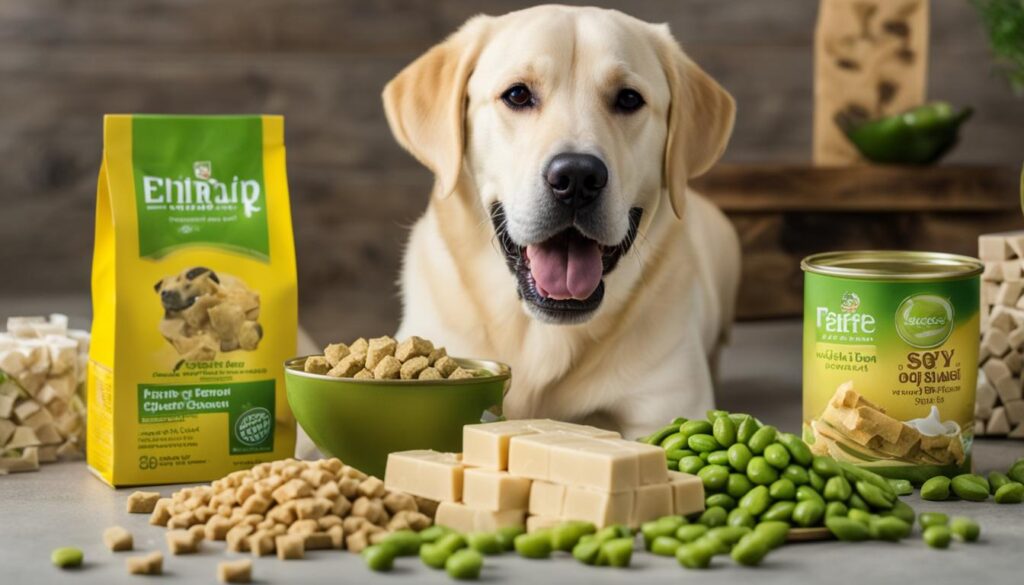Welcome dog lovers! If you’re curious about whether tofu is safe for your furry friend or considering incorporating soy products into their diet, you’ve come to the right place. In this article, we’ll explore the world of tofu and its potential benefits and risks for dogs. So, grab a treat for your pup, sit back, and let’s dig in!
Key Takeaways:
- Tofu can be given to dogs in moderation as an occasional snack, but it should not be the primary source of protein in their diet.
- Tofu is not toxic to dogs and can provide some health benefits like supporting kidney function and heart health.
- However, tofu does not contain enough protein to fulfill a dog’s nutritional requirements, so it is essential to feed them a balanced diet.
- Tofu can be a suitable alternative protein source for dogs with allergies or specific dietary needs.
- Some dogs may have difficulty digesting tofu, and it is important to be mindful of their individual sensitivities.
The Benefits of Tofu for Dogs
When it comes to incorporating tofu into your dog’s diet, there are several potential benefits to consider. Tofu is a complete vegan protein, making it an excellent alternative protein source for dogs with specific dietary needs. It can be particularly beneficial for dogs with allergies to animal-based proteins like beef or chicken. By introducing tofu, you can provide your furry friend with a high-quality protein option that is both nutritious and allergen-free.
Tofu is also suitable for dogs with urinary issues. Compared to meat-based proteins, tofu is low in purines, which can potentially contribute to urinary problems. Therefore, feeding your dog tofu can be a way to support their overall urinary health and well-being.
The Nutritional Value of Tofu for Dogs
Aside from being a protein powerhouse, tofu contains essential nutrients that can benefit your dog’s health. It is rich in isoflavones, which can help lower cholesterol levels and support kidney function in dogs. These isoflavones act as antioxidants and have been shown to have anti-inflammatory properties, contributing to a healthy immune system. Incorporating tofu into your dog’s diet can provide them with these additional health benefits.
How to Introduce Tofu to Your Dog
When introducing tofu to your dog’s diet, it’s important to start with small amounts and monitor their response. Some dogs may have difficulty digesting tofu, leading to gastrointestinal upset and gas. Gradually increase the portion size over time and observe any adverse reactions. If your dog shows signs of discomfort or digestive issues, it may be best to consult with your veterinarian before continuing to incorporate tofu into their meals.
| Benefits of Tofu for Dogs | How to Introduce Tofu to Your Dog |
|---|---|
| Complete vegan protein source | Start with small amounts |
| Alternative for dogs with allergies | Monitor for any adverse reactions |
| Supports urinary health | Gradually increase portion size |
| Contains isoflavones for kidney function and cholesterol reduction | Consult with a veterinarian if necessary |
By considering these benefits and taking the necessary precautions, tofu can be a valuable addition to your dog’s diet. Just remember to prioritize a balanced and complete nutrition plan, consulting with a veterinarian to ensure that your furry friend’s dietary needs are being met.
Risks and Considerations of Feeding Tofu to Dogs
While tofu can be a safe treat for most dogs, there are certain risks and considerations to keep in mind before incorporating it into their diet. First and foremost, dogs with soy allergies or sensitivities should avoid tofu altogether. Soy intolerance in dogs can manifest as gastrointestinal distress, skin irritations, or even allergic reactions. It’s important to consult with your veterinarian if you suspect your dog may have a soy allergy.
Another important consideration is the type of tofu being fed to dogs. Flavored tofu varieties that contain ingredients like onions and garlic should never be given to dogs, as these can be toxic to them. Stick to plain, unseasoned tofu to ensure your dog’s safety and well-being.
Additionally, some dogs may have difficulty digesting tofu, leading to gastrointestinal upset and excessive gas. This is especially true for dogs with sensitive stomachs or a history of digestive issues. If you notice any signs of digestive discomfort after feeding your dog tofu, it’s best to discontinue its use and consult with your veterinarian for alternative protein sources.
Overall, while tofu can provide some health benefits for dogs, it’s crucial to proceed with caution and take into account your dog’s individual needs and limitations. Always consult with your veterinarian before making any significant changes to your dog’s diet to ensure their nutritional requirements are being met.

Table: Risks and Considerations of Feeding Tofu to Dogs
| Risks and Considerations | Explanation |
|---|---|
| Soy Allergies | Dogs with soy allergies or sensitivities should avoid tofu due to the risk of allergic reactions and gastrointestinal distress. |
| Flavored Tofu | Flavored tofu varieties containing ingredients like onions and garlic should not be given to dogs, as they can be toxic. |
| Difficult Digestion | Some dogs may struggle to digest tofu, leading to gastrointestinal upset and excessive gas. |
| Individual Needs | It’s important to consider your dog’s unique dietary needs and consult with a veterinarian before introducing tofu into their diet. |
The Role of Soy in Dog Food
Soy is a commonly used ingredient in many commercially prepared dog foods. It is a plant-based protein source that can provide various health benefits for dogs. Soy products, such as soybean meal and soy protein isolate, are often used as an alternative to animal-based proteins like beef or chicken. These products can help meet the nutritional needs of dogs that have allergies or sensitivities to meat-based proteins. Additionally, soy is a cost-effective ingredient that can help lower the overall cost of dog food without compromising on quality.
When included in dog food formulations, soy provides essential amino acids and nutrients that contribute to a balanced diet for dogs. It is a good source of protein, fiber, and omega-3 fatty acids. The protein in soy is easily digestible, making it suitable for dogs with sensitive stomachs or digestive issues. Soy also contains phytoestrogens, which can have positive effects on a dog’s hormonal balance and overall health.
It is important to note that while soy can be beneficial for many dogs, some may have intolerance or allergies to soy. These dogs may experience gastrointestinal distress, such as diarrhea or vomiting, when consuming soy-based products. If your dog shows any signs of intolerance or allergies, it is best to consult with a veterinarian and explore alternative protein sources for their diet. Overall, the role of soy in dog food is to provide a nutritious and sustainable protein option for dogs, but it should be used judiciously and in consideration of individual dietary needs.
Benefits of Soy in Dog Food:
- Alternative protein source for dogs with allergies or sensitivities to meat-based proteins
- Cost-effective ingredient that helps lower the overall cost of dog food
- Good source of essential amino acids, fiber, and omega-3 fatty acids
- Easily digestible protein option for dogs with sensitive stomachs or digestive issues
- Contains phytoestrogens that can contribute to hormonal balance and overall health in dogs
Risks and Considerations:
- Some dogs may have intolerance or allergies to soy, leading to gastrointestinal distress
- Individual dietary needs and sensitivities should be taken into account
- Consult with a veterinarian if your dog shows signs of intolerance or allergies

| Benefits of Soy in Dog Food | Risks and Considerations |
|---|---|
| Alternative protein source for dogs with allergies or sensitivities to meat-based proteins | Some dogs may have intolerance or allergies to soy, leading to gastrointestinal distress |
| Cost-effective ingredient that helps lower the overall cost of dog food | Individual dietary needs and sensitivities should be taken into account |
| Good source of essential amino acids, fiber, and omega-3 fatty acids | Consult with a veterinarian if your dog shows signs of intolerance or allergies |
| Easily digestible protein option for dogs with sensitive stomachs or digestive issues | |
| Contains phytoestrogens that can contribute to hormonal balance and overall health in dogs |
The Debate Surrounding Soy in Dog Food
When it comes to soy in dog food, opinions are divided. Some experts believe that soy can be a valuable source of nutrition for dogs, while others argue for soy-free options. The debate centers around the potential benefits and risks of including soy products in a dog’s diet.
Proponents of soy in dog food highlight its high nutritional value. Soy is a plant-based protein that can provide dogs with essential amino acids and nutrients. It is also a suitable alternative for dogs with allergies to animal-based proteins. Soy products can be especially beneficial for dogs with dietary restrictions or those with specific health conditions.
However, critics of soy in dog food point out that soy can be a common allergen in dogs, causing gastrointestinal discomfort or other health concerns. Some dogs may also have difficulty digesting soy, leading to digestive issues. For this reason, some owners prefer to opt for soy-free dog food options to avoid any potential risks.
The Great Soy Debate
The debate surrounding soy in dog food ultimately boils down to individual preferences and a dog’s specific dietary needs. It is essential to assess your dog’s allergies, sensitivities, and overall health before deciding to include soy in their diet. Consulting with a veterinarian can provide valuable insights and help you make an informed decision.
| Pros of Soy in Dog Food | Cons of Soy in Dog Food |
|---|---|
| Soy is a complete plant-based protein. | Soy can be a common allergen in dogs. |
| It is a suitable alternative for dogs with protein allergies. | Soy may cause gastrointestinal discomfort. |
| Soy products offer high nutritional value. | Some dogs may have difficulty digesting soy. |
Ultimately, the decision to include soy in your dog’s diet should be based on careful consideration of their individual needs and consultation with a veterinarian. Whether you choose to incorporate soy or opt for soy-free dog food, the most important thing is to provide a balanced and nutritious diet that meets your canine companion’s specific requirements.

Conclusion
In conclusion, dogs can enjoy tofu as an occasional snack, but it should not be the main source of protein in their diet. Tofu is safe for dogs to consume and can even offer some health benefits.
While tofu does not contain enough protein to fulfill a dog’s nutritional requirements, it can still provide support for kidney function, heart health, and even help lower cholesterol levels. It can also be a suitable alternative protein source for dogs with allergies to animal-based proteins.
However, it’s crucial to consider your dog’s individual needs and consult with a veterinarian before introducing tofu or any soy-based products into their diet. Some dogs may have soy allergies or sensitivities, and flavored tofu with ingredients like onions and garlic should be avoided as they can be toxic.
Ultimately, a commercially prepared dog food that provides sufficient protein is recommended to ensure your furry friend’s overall health and well-being. So, while tofu can be a tasty and nutritious treat for your dog, make sure it’s given in moderation and as part of a balanced diet.
FAQ
Can dogs eat tofu?
Yes, dogs can eat tofu in small or moderate amounts as an occasional snack.
Is tofu toxic to dogs?
No, tofu is not toxic to dogs.
What are the benefits of tofu for dogs?
Tofu can support kidney function, promote heart health, and help lower cholesterol levels in dogs.
Can tofu be a primary source of protein for dogs?
No, tofu does not contain enough protein to fulfill a dog’s nutritional requirements, so it should not be the primary ingredient in their diet.
Can dogs with allergies have tofu?
Yes, tofu can be a good alternative protein source for dogs with allergies to animal-based proteins like beef or chicken.
Can tofu be given to dogs with urinary issues?
Yes, tofu is low in purines compared to meat-based proteins and can be suitable for dogs with urinary issues.
Are there any risks or considerations with feeding tofu to dogs?
Dogs with soy allergies or sensitivities should avoid tofu, and flavored tofu with ingredients like onions and garlic should not be given to dogs. Some dogs may have difficulty digesting tofu, and dogs with a history of bloat or breeds prone to bloat should avoid it.
Is soy a common ingredient in commercial dog foods?
Yes, soy is a common ingredient in many commercial dog foods as a source of plant-based protein.
Can dogs have soy intolerance?
Yes, some dogs may have soy intolerance and experience gastrointestinal distress or allergic reactions when consuming soy-based products.
What is the ongoing debate about soy in dog food?
Some experts argue that soy has high nutritional value and can be a valuable protein source for dogs, while others advocate for soy-free dog food options due to concerns about soy allergies and gastrointestinal discomfort.





